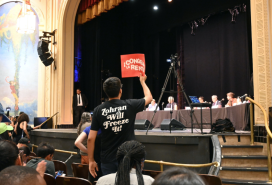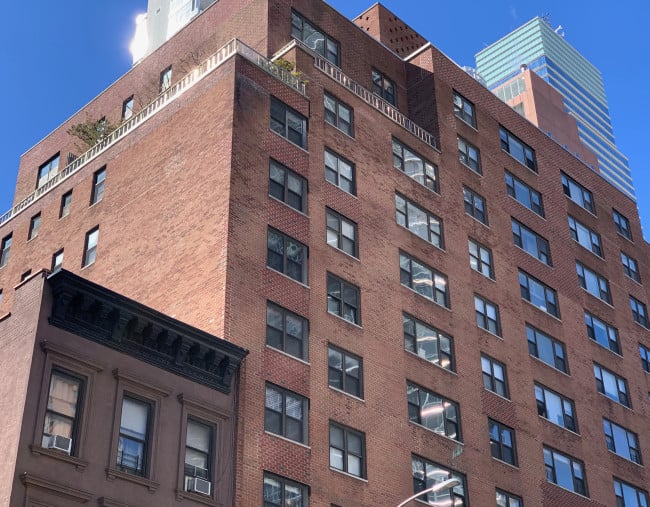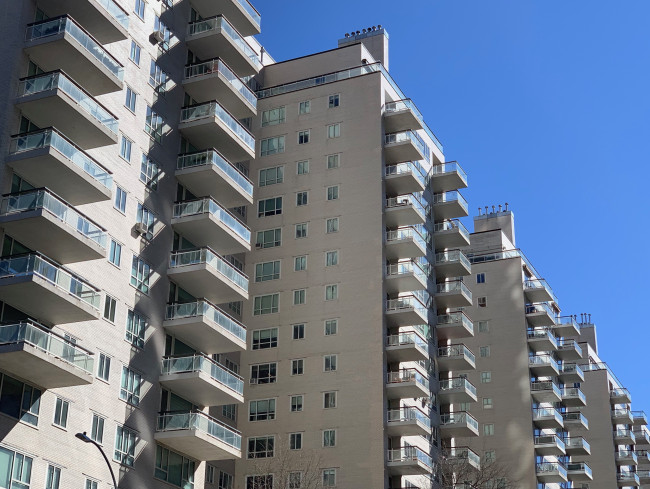The pros and cons of renting in a NYC condo or co-op building
- Look for a building that allows long-term renters so you can stay put
- You'll need board approval, which can slow your application process down

When renting a condo or co-op, you need to know the building’s sublet policies and the owner’s long-term intentions as best as you can.
iStock
Years ago, when I rented a studio apartment in a small, self-managed co-op building in Murray Hill, I got into a disagreement with my upstairs neighbor about noise.
Fed up with her clomping around over my head one night—it sounded like she was wearing high-heeled boots on hardwood floors—I banged on my ceiling with a broom handle to get her to be quieter. She let me know that she didn’t appreciate being told what she could do in her own apartment when she came downstairs and yelled at me.
The kicker is that while she was telling me off at the top of her lungs, she made a point of saying that I was “just a renter,” and that she was going to complain to the board about me. Ouch!
[Editor's note: A previous version of this post was published in February 2025. We are presenting it again in case you missed it.]
But in the light of day, we calmed down and patched things up. I don’t think she complained to anyone and that was the only unpleasant incident I experienced as a renter in a co-op building.
In many ways, it was a very nice place to rent: The building had a live-in super who was responsive, it was very clean, and well run. I had no complaints, other than my boot-wearing neighbor upstairs.
In fact, brokers have told Brick Underground that renting in a New York City condo or co-op is often a way to get a nicer apartment with higher-end finishes and appliances and a better sense of community.
But there are a number of pitfalls that you should be aware of before you sign a lease as a renter in a co-op or condo. You may love your apartment, only to find out that you can’t renew your lease because the owner has maxed out the number of years they are permitted to rent out the apartment, or because they have decided to sell.
Read on for more pros and cons before you sign that lease in a NYC co-op or condo building.
Pro: Everybody knows your name
One of the things you may appreciate as a renter in a condo or co-op is a greater sense of community.
“Many rental buildings have a revolving door and you're not afforded the opportunity to get to know your neighbors. Rental buildings are trying to change this by building huge lounge spaces and hosting social gatherings for their tenants in an attempt to build a ‘community’ feel. However, if it's important to you to recognize and get to know your neighbors, condo or co-ops may be your better bet,” said Andrew Sacks, an agent at Corcoran.
Pro: You get better value
If you are going to rent for a few years, it’s worthwhile to search for a rental in a co-op or condo, as opposed to a rental building, Sacks said. You get more for your money in terms of finishes, appliances, amenities and a well-cared for building.
“The approval process can take longer and the application fees are higher but if you aren't in a rush to get approval and you can amortize the fees over several years, and more often than not you're going to get better value. [Editor's note: Application fees for rentals are capped at $20, but condos and co-ops can charge higher fees.] The trick is to find a building that allows longer-term renters—many have a limit to the number of years someone can rent an apartment in the building,” he said.
When you’re leasing in a condo or co-op you're usually leasing from an individual owner, rather than from a large corporate owner/developer. For that reason, he said, “A vacancy hurts a small landlord a lot more, so the asking rent is a lot more reasonable. They have a financial motivation to get a quality tenant in the unit fast, rather than squeezing someone over a couple of hundred bucks over the course of the year.”
Pro: You live in a well-maintained building
While every building in NYC is different, co-ops and condos are generally constructed with better quality materials and finishes than a rental building, with the exception of luxury rental buildings, said Matthew Hughes, a broker at Brown Harris Stevens. So you will get an apartment with a nicer aesthetic, and common areas like the lobby, hallways, and amenity spaces can be more well-cared for than most NYC rental buildings.
There is usually less wear and tear on common spaces in co-ops and condos.
“Anything that is egregiously outdated or is a health and safety risk is addressed quickly because building staff are beholden to the shareholders/owners,” he said. Plus, you’re likely to find long-time staff members take care of the building and its residents “like their second home.”
Pro: You may be able to buy your apartment (I did)
When I got into that tiff with my neighbor, I was already in the process of buying my studio.
I was lucky because the owners gave me a heads up that they were thinking of selling. Initially, my response was to start looking for somewhere else to live because I was 30 years old and didn’t have a lot of savings—like none. But a family member (my sister!) convinced me to buy.
It made a lot of sense: I knew the building well, and the board knew me as a good tenant. I wrote a detailed offer letter to the owners, who hadn’t stepped foot in the apartment in several years, outlining the problems with the apartment and convinced them to lower the price. This is not something I would recommend in a competitive market, but at the time it paid off.
Con: You’re not on equal footing with owners/shareholders
My one negative experience as a renter in a co-op building, as benign as it was, isn’t an outlier. Owners and renters can have different rights and even fees. Sacks called this a “class system” and said tenants are on the bottom.
“Owners or shareholders tend to hold themselves in a higher regard than they do the building’s renters,” he said. The thinking is that they have invested more in the building. Tenants, on the other hand, are considered less invested.
And as a tenant, you may also have to pay a separate fee to use the amenities in a co-op building.
“It is very rare that condominium buildings do this,” Hughes said. “It has also been my experience that condominium owners who are acting as landlords tend to be more hands-off and laissez-faire, whereas cooperative landlords tend to be stricter, such as conducting inspections throughout the tenancy and having building staff keep an eye on their tenants.
Con: Timing is not always on your side
When you’re renting in a co-op or condo, generally, you’ll have to go before the board to be approved. Although this is less fearsome than if you were buying, it does slow the process down.
“It can take four weeks from when your application is submitted to get formal approval. Just like when you’re purchasing in a co-op, the board can reject the rental application without providing a reason, which can be very frustrating,” Sacks said.
You will also not be able to rent your apartment indefinitely. Buildings typically set limits regarding how many years owners can rent, or what percentage of units can be rented at a time.
An owner might have other reasons for not renewing your lease—always an unwelcome surprise.
“Renters need to understand that there is always a possibility that their landlord will choose not to renew their lease—maybe they want to sell the apartment, or move in themselves. In a condo, it helps if you can verify the apartment has been rented out consistently for four or five years (to show a pattern of it being used for this purpose) but that’s never a sure thing,” Sacks said.
You Might Also Like






























